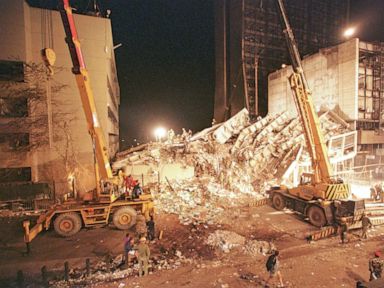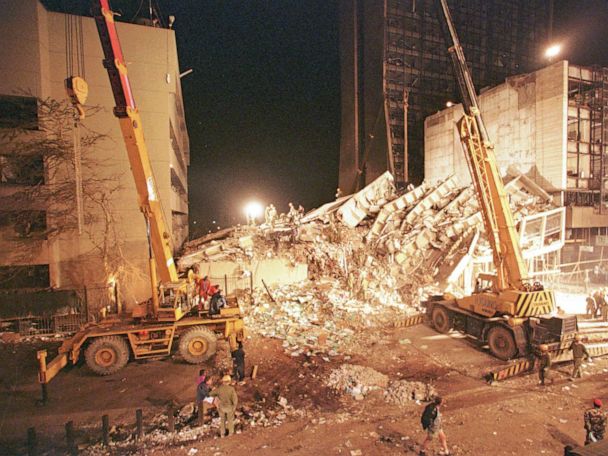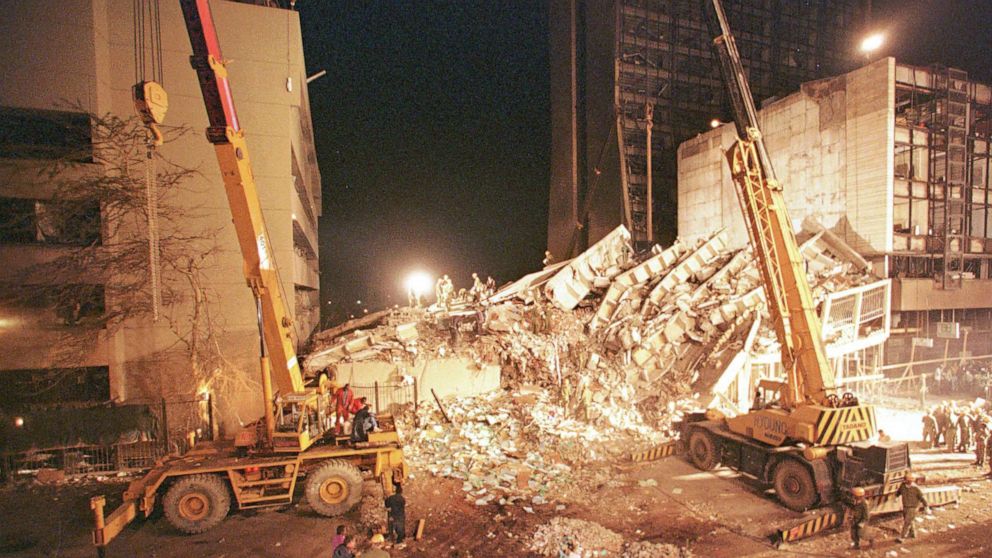





Ellen Richards, Riz Khaliq and Edith Bartley say they are ready for justice.
Twenty-two years and one day since their lives were upended by the bombings at the U.S. Embassies in Tanzania and Kenya, the survivors and the families of those killed have finalized a settlement with the government of Sudan, whose previous leader harbored the al-Qaida operatives responsible for those bloody attacks.
“My family was devastated by the bombing. My whole world was turned upside down. My career in the Foreign Service went down the tubes. But you know, through all of it, through every bit of it, I’ve always believed that justice would be served,” said Richards, who worked for the Commerce Department and was blinded in the Nairobi bombing.
For the Sudanese people, who overthrew genocidal dictator Omar al Bashir in a historic uprising last year — it is also a critical moment.
Amid widespread hunger and political instability, a new civilian transitional government has tried to steer the country through the uncertainty and toward democratic elections. But it has suffered under the yolk of international sanctions that block foreign aid and investment.
The Trump administration has said a settlement for those American families would unlock sanctions relief, including lifting Sudan’s designation as a state sponsor of terrorism by the State Department — the most stringent of commercial penalties.
But there are some concerns that the deal reached, with Sudan offering $335 million in total, is inequitable. One U.S. senator, Bob Menendez, D-N.J., has blocked the congressional approval needed to finalize the settlement, even as its advocates say sanctions must be lifted urgently to support Sudan’s young civilian government.
“This is the first time in as long as I can remember that we have an opportunity to not only hold a country accountable for what they did at that time in history, but also help a country become part of the world economy, help a country set a path toward improving lives of their citizens,” said Khaliq, who was serving as a commercial attaché when he survived the attack in Nairobi.
The bombings killed 224 people, including 12 Americans killed at the U.S. Embassy in Nairobi.
But the settlement, reached with the U.S. government’s backing, would provide $3 million for each American or their family, while most of the victims, who were locally employed staff, will receive $400,000, including those who have since become U.S. citizens.
Menendez, the top Democrat on the Senate Foreign Relations Committee, has called that unfair. His office did not respond to ABC News’ request for comment, but told The Washington Post in a statement, “We need a deal that, at minimum, is fair to all Americans with claims. There is no serious effort in the Senate to approve the Trump deal because it doesn’t meet that minimum standard.”
Bartley, whose father and brother were killed in the blast, said that repeated requests from the families and victims to speak with Menendez have gone unanswered.
In response to his concerns, Bartley, who’s become a spokesperson for the families of those killed, said that the U.S. has provided other means of financial support, including $500 million from Congress’s victims of state-sponsored terrorism fund, and that the U.S. is limited in its ability to negotiate on behalf of other countries’ citizens.
“Our government espouses and only has the authority to espouse the claims of American citizens, those who were Americans at the time of the event,” she told reporters during a briefing with Khaliq, Richards and former congressman and House Foreign Affairs Committee Chair Ed Royce, R-Calif.
“Every agreement could be better. We have to look at what’s obtainable here. We have to look at the ticking time bomb that is the situation that the Sudanese government is in if it doesn’t become stabilized or if it doesn’t get the support, get pulled into the global economy and the international community,” Khaliq added.
It’s been 14 months since those peaceful protests ousted Bashir, an autocratic leader who came to power in a coup in 1989, ruled during decades of oppression and violence, and has been found responsible for genocide and other war crimes in Darfur.
The historic demonstrations against him have powered through violent attacks and a military crackdown and yielded a transitional government that is tasked with laying the ground work for civilian rule and democratic elections.
But that government and Prime Minister Abdalla Hamdok are struggling amid economic instability, deep poverty and now the novel coronavirus. Hamdok was nearly assassinated in March.
To advocates, that puts even greater pressure to act now.
“This happens in the middle of a pandemic, the middle of what Oxfam calls one of the hunger hot spots on the globe, the middle of a collapsing economic system because we can’t get relief in because of this sanction on state sponsor of terrorism — and it’s an injustice to call it that when the very individual is on trial in the country who brought the terror, and we are now in a position of undermining those who are trying to bring him to justice,” said Royce. “That’s the irrationality of where we are right now. That’s why the Senate has to act.”
